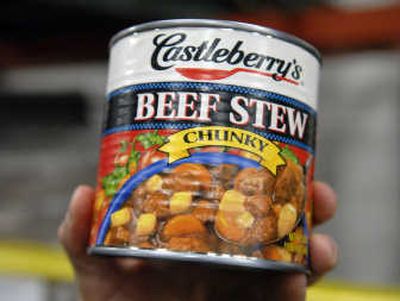Donated food may contain botulism

Workers at Spokane’s largest food bank are sorting through thousands of pounds of donated canned goods, trying to keep chili and other foods potentially poisoned with botulism from reaching the hungry.
As of Thursday, Second Harvest Inland Northwest had pulled more than 300 cans of Castleberry’s beef stew donated through a federal food program and nearly three dozen cans of chili, chili with beans and stew sent by community donors.
“Realistically, for the foreseeable future, we’ll be scouring all food products that come in,” said Jason Clark, executive director of the agency, which sends more than 900,000 pounds of food a year to 300 neighborhood food banks and meal programs.
“It’s a serious issue.”
No one in Washington or Idaho has been sickened by foods identified in a national recall that includes more than 90 products and 27 brands of canned chili, stew, hash, gravy and pet food.
Four people in Texas and Indiana who ate Castleberry’s hot dog chili sauce came down with food-borne botulism linked to the products. A California woman also contracted botulism after eating a recalled chili product, although the link has not been confirmed, according to the federal Centers for Disease Control and Prevention.
Castleberry’s Food Co. has closed its Georgia canning operation while an investigation continues. Products were shipped to about 8,500 retail outlets nationwide.
But federal, state and regional health officials are worried that word of the recall first issued July 18 hasn’t reach enough people – and that the potentially fatal illness may be lurking on shelves of small stores, food banks and home cupboards.
“It is surprising how much product is still out at these mom-and-pop stores,” said Claudia Coles, food safety program manager for the Washington state Department of Agriculture.
WSDA officials found cans of recalled chili and other products on the shelves of at least 57 Washington retailers during a sweep last week, Coles said.
They were joined by inspectors from county health agencies, including the Spokane Regional Health District, where staff spent this week calling hundreds of store owners to remind them of the potential danger.
At least 300 grocery and conveniences stores are licensed by the health district, but dozens more may carry canned goods and other foods without being licensed, said Ray Byrne, food program manager for the district. Workers also have reached out to campgrounds and other remote places where canned goods may linger for months.
“The concern is that they might not have heard about the recall at all,” Byrne said. “We’ve had several facilities that have come up with the product.”
At Second Harvest, organizers were told in late May to hold about 300 24-ounce cans of Castleberry’s beef stew, Clark said. They were among about 2,000 cans delivered statewide for use in the U.S. Department of Agriculture’s Commodity Supplemental Food Programs, which provide food to vulnerable people, including pregnant women, new mothers, children under 6 and people older than 60.
The larger cans aren’t among the dozens of products included in the national recall, which lists the 15-ounce beef stew. But they were regarded as suspicious when some of the cans appeared to be bulging, often a distinctive sign of botulism, said Jim Erskine, a spokesman for the Washington state General Accounting office.
“They haven’t told us what to do with this stuff yet,” said Clark, who has segregated the suspicious stew from the rest of his donations.
People who find cans of recalled Castleberry’s products should follow disposal advice from health officials: Double-wrap the cans in plastic bags that are tightly closed. Place the wrapped cans in a bin for non-recyclable trash outside of the home. Tainted cans may swell, bulge or explode. If any of the cans are bulging or leaking, consumers should use gloves and eye protection when handling them. Make sure to wash hands well for at least two minutes with soap and running water afterward.